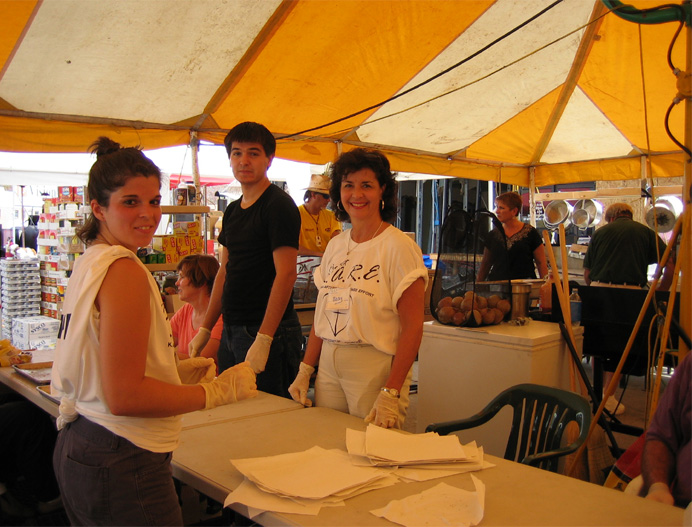Posted on Jan 11, 2008 | by Michael Chute
JACKSON, Tenn. (BP)--Cultural issues facing the church, as well as
lack of integrity by some evangelists, are undermining the
effectiveness of Southern Baptist evangelists, participants in a Jan.
7-8 evangelism summit in Jackson, Tenn., said.
Jerry Drace of Humboldt, Tenn., called together 15 prominent Southern
Baptist evangelists, representing more than 450 years of ministry, to
take stock of the challenges they face and address possible solutions
to diminishing opportunities among the Southern Baptist Convention's
44,000-plus churches.
An opening question for the summit considered whether the days of mass
evangelism are over in Southern Baptist life.
"The public proclamation of the Gospel always works," said Hal Poe,
Charles Colson Professor of Faith and Culture at Union University in
Jackson. "For 2,000 years, in every time, place and culture, the
public proclamation of the Gospel works. From Peter in Jerusalem on
the Day of Pentecost, to Francis of Assisi gathering a crowd in the
plazas of Italy as he preached to the birds, to the Puritans
'lecturing' in the town halls, to [John] Wesley and [George]
Whitefield preaching in the fields and coal yards, to the Methodist
circuit riders at camp meetings, to D.L. Moody preaching in great
urban settings, to Billy Graham preaching in stadiums, the public
proclamation of the Gospel always works, because 'the Gospel is the
power of God unto salvation to those that believe.'"
A key theme of the summit was integrity among evangelists to safeguard
their ministries and maintain the image of the office -– dealing with
finances, reporting results, maintaining relationships with pastors,
nurturing their families and even crediting others if using their
material in preaching.
"When pastors say, 'Evangelistically speaking,' you know what they're
saying -– we're going to exaggerate," lamented Drace, who, as
president of the Conference of Southern Baptist Evangelists (COSBE) in
2000, led the group to adopt "Affirmations of Accountability," a code
of ethics.
"What we preach, we better live; what we sing, we better live. So many
of the Southern Baptist evangelists are just outstanding men and women
of integrity -- the vast majority are. But I lose respect from
somebody when they have sold out themselves," Drace said.
"When you've got evangelists like Wayne [Bristow] and Sammy [Tippit]
and Glenn [Sheppard] -– these men whose ministries are solid as a rock
-– those are the models that we need. These guys have a proven track
record with their ministries and with their families."
Participants chaffed over the negative image of evangelists in today's
secular culture but acknowledged some in their ranks have contributed
to that view of the church office outlined in Ephesians 4:11.
"We are fighting against the media because of televangelists," said
Tippit of San Antonio, Texas, a leading international evangelist and
author of "God's Secret Agent." He said the late Jerry Falwell was
known worldwide as an evangelist because of his TV ministry but noted
that he was a pastor. He pointed out that Jim Bakker was a
televangelist, alluding to the "PTL Club" scandal that led to his
resignation from the ministry. "In everybody's mind they're thinking
of us this way and we need to redefine that [image]."
Keith Cook of Nashville, Tenn., said America's postmodern culture sees
an evangelist as somebody they're afraid of. He called on evangelists
to "de-emphasize the person and emphasize what we're doing. We have to
be wise in our culture. Not diminish the message, but to get on stage
we have to be creative."
Michael Gott of Keller, Texas, defined a Southern Baptist evangelist
as "a nobody trying to tell everybody about Somebody who can change
anybody. That's exactly who we are and exactly what we're doing."
Drace asked Baptist churches in the Jackson area to invite the
evangelists to preach in worship services on Sunday, Jan. 6. They came
from ministries based in eight states: Florida, Georgia, Kentucky,
Mississippi, Missouri, Oklahoma, Tennessee and Texas. He then brought
the pastors and evangelists together in a roundtable discussion Jan.
7.
Several pastors spoke to the cultural challenges facing churches in
trying to host evangelistic events. Ken Story, pastor of Malesus
Baptist Church in Jackson, said that "in the 1950s, you could open
your door, put up a shingle that said 'church,' and the world came.
Everything in the culture pressured people to go to church. You had to
be a Bible-toting Christian or you couldn't get elected to office or
have a successful business.
"It's not that way today -– they're running from you as hard as they
can go. Not only evangelism but churches are tarnished by our culture.
Words like 'revival' are passť that people laugh at if you advertise
it. You have to find some way to present the Gospel to where it meets
a need.
"We don't know how to get people to come hear the evangelist. We'd
love to have a revival but we're embarrassed that they only come to
hear us on Sunday morning. We have a hard time justifying a revival
when nobody's going to come."
Participants called for building stronger pastor-evangelist
relationships, identifying trust as an underlying issue.
Chuck Williams, pastor of Jackson's Calvary Baptist Church, talked
about the pressure he has felt from some evangelists. "If the love
offering's not there, it's my fault. If the decisions aren't there,
it's my fault," Williams said. "That's the bottom line."
He spoke of one unnamed evangelist that Williams said he "couldn't get
him out of my church fast enough. It wasn't what he did to the church;
it was what he did to me personally. He demanded from me 10 references
and chewed me out because I didn't give them to him.
"We've had some great evangelists too, but I'm just telling you
sometimes this is just the way it is. What you are doing here today is
great because what [pastors] need are personal relationships [with
evangelists]."
Glenn Sheppard of Glenwood, Mo., a former pastor who has preached in
more than 160 countries over a 45-year evangelism career, publicly
apologized to the pastors.
"We must walk with integrity, and not demand, but serve our pastors,"
Sheppard said. "Forgive us. Forgive the heritage that's done this kind
of thing. There's a generation of us who want to work and walk in
integrity and are determined to so."
Sheppard added what churches today are asking what's his "bottom line"
for a meeting -– whether he has a set fee.
"I want to cry," he said. "I have no desire to tell you what I've got
to have [financially] to come. If we've got to have X amount from you,
then we're in [evangelism] for the wrong purpose. I don't have a fee;
I have a Master and a call. If you'll give a love offering, that's
great; if you won't, that's OK. But you'll be more blessed if you do;
I believe that's a biblical priority and we leave it at that and trust
God."
Story said that when he was pastor of Germantown (Tenn.) Baptist
Church evangelists learned it was an affluent church and called him to
ask how large the love offering was going to be. But others talked
about pastors or churches withholding a love offering because they
thought the church had been too generous.
"What has been said on the side of the pastors can be said on the side
of the evangelists, too," said John Adams, pastor of East Union
Baptist Church in Jackson. "Every coin has two sides and I know that
has happened [on the pastors' side]."
Tippit said evangelists need to address the financial issues but
reminded the group that "a lot of guys who start off in evangelism are
under pressure. They have small children. They're trying to provide
for a livelihood. They don't have a congregation, and that pressure is
on them and that needs to be understood."
The evangelists expressed their burden for lost people and lamented
the diminishing numbers of evangelistic opportunities. Sheppard asked
if the North American Mission Board could not subsidize church
revivals, in which the evangelist's expenses would be paid but he
would give the time without an honorarium. Brian Fossett, COSBE
president who represented that organization, and Jim Coldiron, NAMB
evangelism consultant, told the group about a pilot initiative -–
Baptism Assistance Project -– to provide that kind of support.
"We've not put it in place, just one or two evangelists doing it here
or there over the last year," Coldiron said. "The response so far has
been good. That's an idea that's in the process."
But Fossett said "the opportunities are basically going to be mission
trips. We don't want evangelists in COSBE thinking these are large
meetings because they're not. They're mission trips."
He said he took one of these projects that was close to his home base
in Dalton, Ga. The church had 20 people in attendance that Sunday
morning and three were saved.
Fossett said he thanked God for those three professions of faith but
reminded the group that "most people would hear 20 [people] and think
that's not very many, but that's the kind of churches we are talking
about."
Cook added that the times may require evangelists to "partner with
churches to do campaigns where we just tote it. We help them raise
some funds for their communities and help them do some things in
evangelism right now because the churches aren't having revivals.
"This may be the prime time for us to go into smaller cities, towns
and neighborhoods and do some united campaigns with three or four
churches. But if the individual churches think they're too small, it
may be a time for some of us to work together and help some of these
folks do things in evangelism they've never tried before."
Darrell W. Robinson of The Woodlands, Texas, former vice president for
evangelism at the Home Mission Board (now NAMB), told the group not to
pay attention to myths about evangelism because a myth is something
believed to be true but isn't.
"We hear all this stuff that won't work. Myths that revivals won't
work," he said, adding: "They won't if you don't. Sharing Jesus with
people, confrontational evangelism, door-to-door witnessing, sowing
won't work anymore; they can't if you don't. If we believe the myths
are true, then it becomes true for us and we begin to act as if it's
true.
"If we're talking about affluence, and [the] upper middle class, some
of it might be true. But you get out there where these common,
ordinary people are every day and they're hungry for the Word, they're
desperate, they're needy and they're reachable. We just got to go get
them."
Drace said the initial goal of the summit was to get these men
together "to share our hearts and minds about issues that really are
vital to us. We have known each other for years, but this is the first
time we've had a chance to sit down and really talk. We pass in
airports."
--30—-
Michael Chute is a professor of journalism at Union University in
Jackson, Tennessee
2009

Our family, June 2009, broadcasting for Hope for the Home radio.




